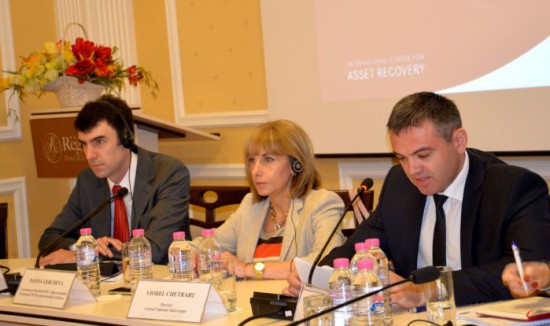Republic of Moldova needs an authority specialized in recovery of illegally acquired assets
Republic of Moldova needs an authority responsible for recovery of assets acquired from criminal activities, recommends a UNDP study, launched today, 31 May 2016. The research was conducted within the “Strengthening the corruption prevention and analysis function of the National Anticorruption Center”, financed by the Norwegian Ministry of Foreign Affairs.
“Unfortunately news about assets stolen and acquired by public officials through corruption is not a surprise in many countries. Values of these assets may vary, but the true cost of corruption far exceeds the value of assets stolen. Corruption undermines society’s prospects for prosperity and resilience and diverts financial resources from production of public goods to private pockets. It also diminishes the trust in institutions and erodes the very foundations of democracy and rule of law. Those who are mostly affected by corrupted practices are the most poor, vulnerable and marginalized groups of society who are deprived from basic social services and access to justice”, mentioned Dafina Gercheva, UN Resident Coordinator and UNDP Resident Representative in Moldova.
”In this context, this Analytical study brings a qualified international expertise and an independent opinion regarding the tools on strengthening of the asset recovery system in Moldova, which once implemented, will contribute to advancing the Government’s anticorruption agenda” added Dafina Gercheva.
Viorel Chetraru, the director of the National Anticorruption Centre, said: “Assets recovery and confiscation of property acquired through unlawful means is a priority for Moldova. Recently, the representatives of the International Monetary Fund, who met with the Moldovan Government recommended to ensure transparency of share ownership and the final beneficiaries of the national banking system. The bank fraud in Moldova has highlighted major issues to recover damages. Until now we had no practice to recover assets from abroad. That is why it is time to learn this lesson.”
The author of the study on Asset Recovery and Confiscation in Moldova is Pedro Gomes Pereira, from the Basel Institute on Governance, Switzerland – one of the most prestigious competence centers in asset recovery.
The report states that lack of an integrated policy of management and recovery of assets in Moldova makes difficult the evidence collection, sequestration, confiscation and incomes recovery. At the same time, Republic of Moldova does not have experience in tracking, sequestration and confiscation of assets abroad.
That is why is needed to consider setting an authority responsible for recovery of assets – Asset Recovery Office (ARO). Such an authority, based on the best international practices, should have a multidisciplinary structure comprising expertise from law enforcement, judicial authorities, tax authorities, social welfare, customs and other relevant services. “These representatives should be able to exercise their usual powers and to disclose information within ARO without being bound by professional secrecy”, said Pedro Gomes Pereira. AROs should be adequately resourced and serve as central point for all incoming requests of assistance from other countries. They should collect all relevant statistics on asset freezing and confiscation.
Pereira recommends for Moldova placing this authority within the National Anticorruption Center, given that it is currently responsible for investigating money laundering, hosts the Financial Intelligence Unit, and has access to country electronic databases.
The study also recommends creating a database identifying all sequestered assets as a result of a criminal activity, which would increase transparency in the process of sequestration and accountability of the seizing authority.
Finally, Moldovan authorities should consider appointing an asset manager at the beginning of a case. The asset manager shall support the financial and criminal investigation team to determine which assets should be seized taking into consideration the cost/benefit of such an action.
31 May 2016

